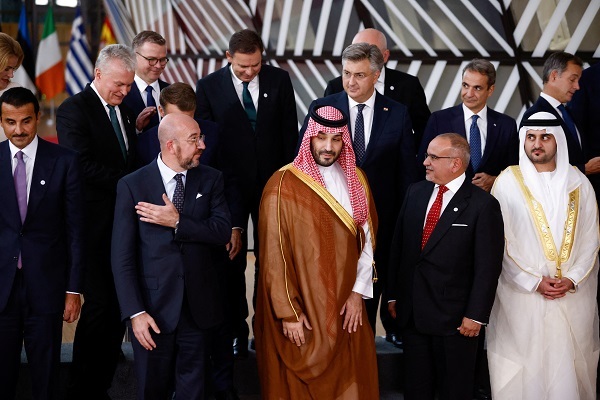
TABNAK, Oct, 19: EU-(P)GCC relations are based on the Cooperation Agreement signed in 1989, which established regular dialogue on cooperation between the EU and the P(GCC) in areas including economic relations, climate change, energy, environment and research.
The Cooperation Agreement also established the Joint Council of the European Union and the (Persian) Gulf Cooperation Council at the level of foreign ministers, which meets regularly.
During the joint council meeting held in Brussels in February 2022, the foreign ministers of the EU and the (Persian) Gulf Cooperation Council approved the joint cooperation program for 2022-2027, which was updated in October 2023.
In May 2022, the European Commission and its High Representative issued a joint statement on the "Strategic Partnership with the Persian Gulf", which was approved by the Council in June 2022. This communication provided an operational roadmap for the European Union to develop closer relations with the member states of the (Persian) Gulf Cooperation Council.
The European Union is the second largest trade partner of the Persian Gulf Cooperation Council countries. In 2023, EU’s imports of fossil fuels accounted for more than 75% of its imports from (P)GCC countries. Since 2020, fuel imports have more than tripled - due to a drastic change in EU supply sources, caused by the war in Ukraine.
The Saudi crown prince participated in the European Union meeting in Brussels for the first time and joined the heads of 27 EU countries and the leaders of six members of the (Persian) Gulf Cooperation Council, which is considered to be a sign of deepening relations between the Council and the European Union.
At the end of this meeting and in the joint statement, certain allegations were raised against the three Iranian islands (the Greater Tunb, the Lesser Tunb and Abu Musa).
The joint statement concluded in the final meeting of the (Persian) Gulf Cooperation Council and the European Union, claimed: “We want Iran to end occupation of the three islands of the United Arab Emirates which include, the Greater Tunb, the Lesser Tunb and Abu Musa. This occupation violates the sovereignty of the United Arab Emirates and the principles of the United Nations Charter.”
On the other hand, on October 17, Iranian Foreign Minister Abbas Araqchi wrote on X, "The era of the malicious policy of "divide and rule" by the Europeans in our region has been over for a long time. Iran’s section mentioned in the joint statement of the European Union and the Persian Gulf Cooperation Council contains many messages. It is clear to us that the path of respectful cooperation that we proposed to them in various meetings, including in New York, has now been answered by Europe's desire to "confront" through the banning of passenger flights and the absurd accusation of "occupation" Iran!”
“The three islands have always belonged to Iran and will remain so forever.”
The joint statement of the European Union and the (Persian) Gulf Cooperation Council is more dangerous than the joint statement released by China and Russia about the Iranian islands.
Of course, the statements of China and Russia are dangerous as well because in addition to doubting Iran's sovereignty over these islands, they have mentioned the International Court of Justice to resolve this dispute.
The importance of this matter is that if one day the UAE refers the case of these islands to the UNSC, this council can refer it to the International Court of Justice. This issue that does not seem to face the veto from China and Russia. Prof. Nader Entesar, Chair the Political Science Department at the University of Alabama, USA, in an interview with Tabnak News Website said, “The UN Security Council can intervene and issue a resolution on any issue that threatens global security in the view of this council.”
“If one day the issue of the UAE's allegations is brought up in the UN Security Council, it is likely that the United States, England and France will support the UAE. If the UAE can force Russia and China to abstain at least, then a case in this regard will be opened in the UN Security Council and the International Court of Justice will be requested to investigate the UAE's claims. Of Course, Iran does not have to recognize the possible decision regarding the UAE's allegations raised in the International Court of Justice,” he continued.
“However, if the day the Security Council and the International Court of Justice want to examine this issue, Iran will face a serious failure in its diplomacy. Therefore, it is not permissible to back off in this challenge that the UAE has put in front of Iran for a long time. Therefore, just summoning the ambassador to the Ministry of Foreign Affairs and sending him a memorandum of protest will help.”
According to Entesar, the only practical way to thwart actions of the UAE for Iran is to exercise its complete sovereignty over the three islands.
“What is important is that Iran has to strengthen its ownership of the Persian Gulf islands put the other side in the fait accompli. Iran has to develop those three islands. Iranian citizens should be given privileges to settle in these islands.”
“The economic infrastructure of these islands must be rebuilt. That is, Iran should increase its permanent presence (political, economic and military presence) in these islands to such an extent that these islands become an integral part of Iran and in practice become like islands like Kish and Qeshm.”
“If Iran does not do this, it will become the loser of the UAE's legal game or will be forced to be stuck in the UAE's playground for a long time.”